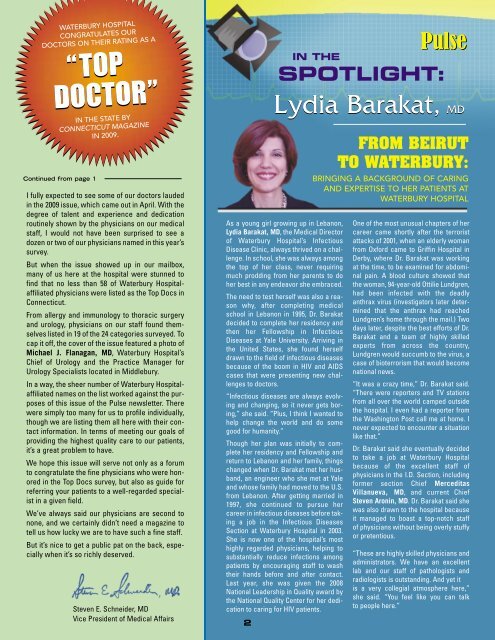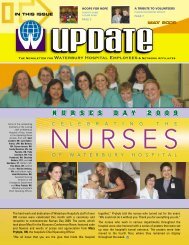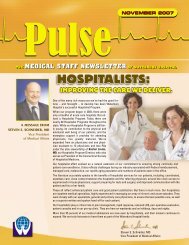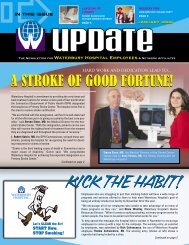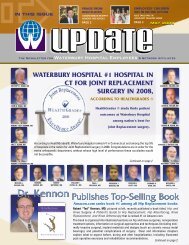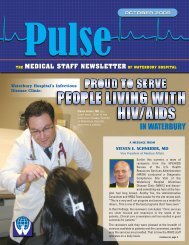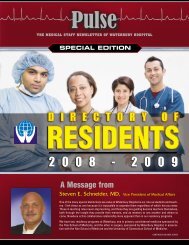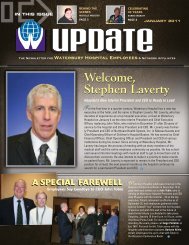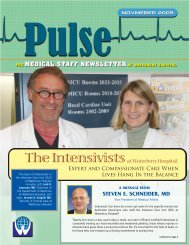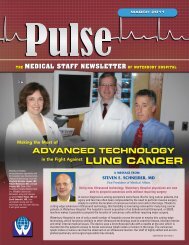June 2009 - Waterbury Hospital
June 2009 - Waterbury Hospital
June 2009 - Waterbury Hospital
You also want an ePaper? Increase the reach of your titles
YUMPU automatically turns print PDFs into web optimized ePapers that Google loves.
IN THESPOTLIGHT:Lydia Barakat, MDContinued from page 1I fully expected to see some of our doctors laudedin the <strong>2009</strong> issue, which came out in April. With thedegree of talent and experience and dedicationroutinely shown by the physicians on our medicalstaff, I would not have been surprised to see adozen or two of our physicians named in this year’ssurvey.But when the issue showed up in our mailbox,many of us here at the hospital were stunned tofind that no less than 58 of <strong>Waterbury</strong> <strong>Hospital</strong>affiliatedphysicians were listed as the Top Docs inConnecticut.From allergy and immunology to thoracic surgeryand urology, physicians on our staff found themselveslisted in 19 of the 24 categories surveyed. Tocap it off, the cover of the issue featured a photo ofMichael J. Flanagan, MD, <strong>Waterbury</strong> <strong>Hospital</strong>’sChief of Urology and the Practice Manager forUrology Specialists located in Middlebury.In a way, the sheer number of <strong>Waterbury</strong> <strong>Hospital</strong>affiliatednames on the list worked against the purposesof this issue of the Pulse newsletter. Therewere simply too many for us to profile individually,though we are listing them all here with their contactinformation. In terms of meeting our goals ofproviding the highest quality care to our patients,it’s a great problem to have.We hope this issue will serve not only as a forumto congratulate the fine physicians who were honoredin the Top Docs survey, but also as guide forreferring your patients to a well-regarded specialistin a given field.We’ve always said our physicians are second tonone, and we certainly didn’t need a magazine totell us how lucky we are to have such a fine staff.But it’s nice to get a public pat on the back, especiallywhen it’s so richly deserved.Steven E. Schneider, MDVice President of Medical AffairsAs a young girl growing up in Lebanon,Lydia Barakat, MD, the Medical Directorof <strong>Waterbury</strong> <strong>Hospital</strong>’s InfectiousDisease Clinic, always thrived on a challenge.In school, she was always amongthe top of her class, never requiringmuch prodding from her parents to doher best in any endeavor she embraced.The need to test herself was also a reasonwhy, after completing medicalschool in Lebanon in 1995, Dr. Barakatdecided to complete her residency andthen her Fellowship in InfectiousDiseases at Yale University. Arriving inthe United States, she found herselfdrawn to the field of infectious diseasesbecause of the boom in HIV and AIDScases that were presenting new challengesto doctors.“Infectious diseases are always evolvingand changing, so it never gets boring,”she said. “Plus, I think I wanted tohelp change the world and do somegood for humanity.”Though her plan was initially to completeher residency and Fellowship andreturn to Lebanon and her family, thingschanged when Dr. Barakat met her husband,an engineer who she met at Yaleand whose family had moved to the U.S.from Lebanon. After getting married in1997, she continued to pursue hercareer in infectious diseases before takinga job in the Infectious DiseasesSection at <strong>Waterbury</strong> <strong>Hospital</strong> in 2003.She is now one of the hospital’s mosthighly regarded physicians, helping tosubstantially reduce infections amongpatients by encouraging staff to washtheir hands before and after contact.Last year, she was given the 2008National Leadership in Quality award bythe National Quality Center for her dedicationto caring for HIV patients.2FROM BEIRUTTO WATERBURY:BRINGING A BACKGROUND OF CARINGAND EXPERTISE TO HER PATIENTS ATWATERBURY HOSPITALOne of the most unusual chapters of hercareer came shortly after the terroristattacks of 2001, when an elderly womanfrom Oxford came to Griffin <strong>Hospital</strong> inDerby, where Dr. Barakat was workingat the time, to be examined for abdominalpain. A blood culture showed thatthe woman, 94-year-old Ottilie Lundgren,had been infected with the deadlyanthrax virus (investigators later determinedthat the anthrax had reachedLundgren’s home through the mail.) Twodays later, despite the best efforts of Dr.Barakat and a team of highly skilledexperts from across the country,Lundgren would succumb to the virus, acase of bioterrorism that would becomenational news.“It was a crazy time,” Dr. Barakat said.“There were reporters and TV stationsfrom all over the world camped outsidethe hospital. I even had a reporter fromthe Washington Post call me at home. Inever expected to encounter a situationlike that.”Dr. Barakat said she eventually decidedto take a job at <strong>Waterbury</strong> <strong>Hospital</strong>because of the excellent staff ofphysicians in the I.D. Section, includingformer section Chief MerceditasVillanueva, MD, and current ChiefSteven Aronin, MD. Dr. Barakat said shewas also drawn to the hospital becauseit managed to boast a top-notch staffof physicians without being overly stuffyor pretentious.“These are highly skilled physicians andadministrators. We have an excellentlab and our staff of pathologists andradiologists is outstanding. And yet itis a very collegial atmosphere here,”she said. “You feel like you can talkto people here.”


